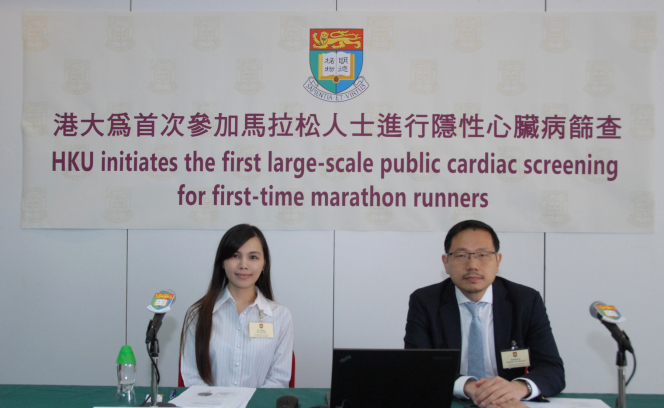Media
HKU initiates the first large-scale public cardiac screening for first-time marathon runners
Hopes to reduce the morbidity and mortality of cardiovascular diseases
20 Oct 2015

Dr Jo Jo Hai Siu-han, Clinical Assistant Professor of Department of Medicine, Li Ka Shing Faculty of Medicine, HKU (Left) and Professor Tse Hung-fat, William M W Mong Professor in Cardiology, Chair Professor of Department of Medicine, Li Ka Shing Faculty of Medicine, HKU (Right) introduced the Pre-participation Cardiovascular Screening Program for Hong Kong Marathon Runners (CASPAR).
Long-distance running is gaining popularity in Hong Kong and the number of participants of marathon in Hong Kong increases every year. However, data shows that most of the marathon participants are non-professional runners and regular training is not mandatory. Cardiovascular diseases may be triggered when doing acute and intensive exercises like marathon, especially to people who do not participate in regular exercises. Therefore, researchers from Department of Medicine of Li Ka Shing Faculty of Medicine, The University of Hong Kong (HKU) will initiate the first large-scale public cardiac screening for first-time marathon runners, hoping to reduce the morbidity and mortality of cardiovascular diseases of marathon participants.
“Overseas studies have shown that regular moderate exercise reduces cardiovascular risk by 20%, and regular vigorous exercise reduces cardiovascular risk by 30-40%. Furthermore, over an 8-year period, regular vigorous exercise reduces all-cause mortality by 70% in men and 80% in women, showing that exercise is the most effective way to keep us healthy. However, from 2002 to 2012, 9 participants sustained major irreversible health damage due to cardiovascular causes, including 2 mortalities. International studies point out that cardiac screening can potentially detect cardiovascular diseases and reduce the risk of morbidity. Therefore, the public cardiac screening will be initiated to protect athletes’ health in Hong Kong,” said Professor Tse Hung-fat, William M W Mong Professor in Cardiology, Chair Professor of Department of Medicine, Li Ka Shing Faculty of Medicine, HKU.
Aim of the public cardiac screening program
Dr Jo Jo Hai, the principal investigator of the study added, “The aim of this study is to assess the feasibility, efficacy and cost-effectiveness of cardiovascular screening in Hong Kong to provide information of implementation of related policies in the future. However, no screening is 100% accurate. As with all medical assessment, false positive and false negative results are possible. If participants are uncertain about the screening results, especially when new symptoms develop, we advise seeking proper medical attention.”
Details of the public cardiac screening program
Li Ka Shing Faculty of Medicine, HKU has launched the Pre-participation CArdiovascular Screening Program for Hong Kong MArathon Runners (CASPAR) for all first-time participants to marathon events who are 18 years old or above. For those who are interested in participating in the study, please visit the website http://sc-marathon.ga/. In the first part of the screening, participants will be asked to fill in an online questionnaire with personal information, symptoms, personal and family history. In the second part of the screening, the Faculty will contact participants to schedule a clinic visit for measurements of body weight, body height and blood pressure. Electrocardiogram, urine and blood tests will also be performed. An exercise stress test will be performed on those who are found to be at high-risk of cardiovascular disease. The screening is voluntary and free of charge, all participants of the screening will be asked to provide proof of participation in marathon events. The screening is sponsored by the Sun Chieh Yeh Heart Foundation.
Cardiovascular diseases triggered by marathon events
Marathon running has gained tremendous success in promoting regular exercise and healthy lifestyle in Hong Kong. Nevertheless, those who have underlying heart disease can develop serious cardiovascular complications during strenuous exercise. A study on cardiovascular complications in a large-scale marathon race has shown that, from 2002 to 2012, 4 participants developed sudden cardiac arrest, 2 of them failed resuscitation, and 5 participants developed heart attack. This year, 1,152 participants sought medical help during the race, 40 of them were hospitalised, and one participant died in a 10 km race. Participants who developed serious cardiovascular complications during training have not been included. The occurrence of health complications in open race are possibly due to the lack of experience, appropriate training and understanding of personal physical condition. According to an overseas study, inexperienced runners develop 50% more complications than experienced runners during marathon race.
For photos and powerpoint presentation, please click the below link:
http://www.med.hku.hk/v1/news-and-events/press-releases
Professor Tse Hung-fat, William M W Mong Professor in Cardiology, Chair Professor of Department of Medicine, Li Ka Shing Faculty of Medicine, HKU, said, “International studies point out that cardiac screening can potentially detect cardiovascular diseases and reduce the risk of morbidity. Therefore, the public cardiac screening will be initiated to protect athletes’ health in Hong Kong.”


